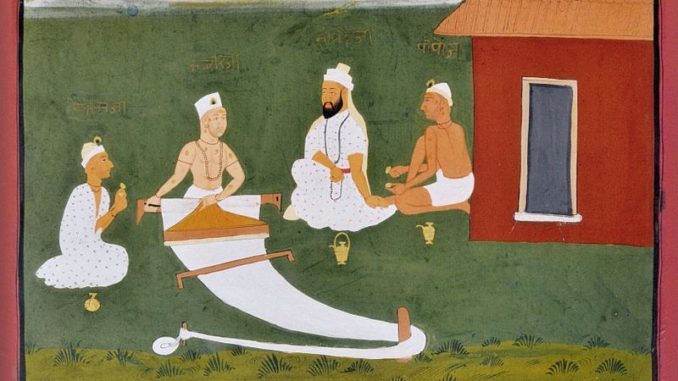
Wikimedia Commons
“And I’ll know my song well before I start singing” Bob Dylan ( from A Hard Rain’s A-Gonna Fall)
Jordi Savall: Orient et occident: Hommage à la Syrie
“The result is not like a typical crossover experiment so much as it is a trans-Mediterranean stew of closely related styles. Played by this group, on this combination of instruments, dances from the Italian trecento, Sephardic romances, Persian classical music, and thirteenth century Spanish dances all sound like they are cut from the same cloth. It is even more integrated than, say, Yo-Yo Ma‘s Appalachia Waltz. With Ma‘s group, one can tell from the slickness and high virtuosic sheen of the pieces that Appalachia Waltz isn’t your standard brand of bluegrass music. Comparatively, it would be really rather difficult to identify anything on Orient-Occident 1200-1700 apart from a well-recorded and performed disc of traditional Arabic music, or for that matter, one of Savall‘s own past recordings of medieval dance music.
“The point of Orient-Occident 1200-1700 is to illustrate how closely related culturally the music of the Mediterranean is, despite the division of its people and religions into Christian, Jewish, and Arabic camps. That there is war in the region and wholesale slaughter in the Middle East on a daily basis as this is written (October 2006) is doubtless weighing heavily on the minds of these musicians, and it is doubtful that any of them are laboring under the illusion that their efforts in making Orient-Occident 1200-1700 will change things as they are. To stop the deadly collision of Arab extremism, right-wing Zionism, Western oil interests, and laissez faire imperialism and to rid the region of its violence is a bit too tall an order to expect these eight musicians to fulfill, despite their excellence. Nevertheless, on a musical basis alone, Orient-Occident 1200-1700 is superb — it really is. The cultural exchange that creates the unique blend of elements experienced here almost seems to fill in the blanks of the old source music. For example, here is heard a much richer Lamento di Tristano than we are used to, and if these ears were more naturally attuned to the sound of a Turkish Makam such as Uzal Sakil “Turna,” perhaps the impression would be much the same. By bringing these elements — instruments, surviving texts, and expert players — together, we get a full menu of the flavor of traditional Mediterranean music, as it might have been known to a traveler in a time before there was conflict between these cultures on a large scale.”
Read full review here:
https://www.allmusic.com/album/orient-occident-1220-1770-mw0001053421
Rahim Alhaj: Letters From Iraq
Dhafer Youssef, Ustad Zakir Hussain, Husnu Senlendirici – Sounds Of Mirrors. Live
Poetry Against Hate: Bhakti & Sufi Potery from India.
(Webinar by PeacFeaturing Dr. Moazzam Siddiqi)
*******

Leave a Reply